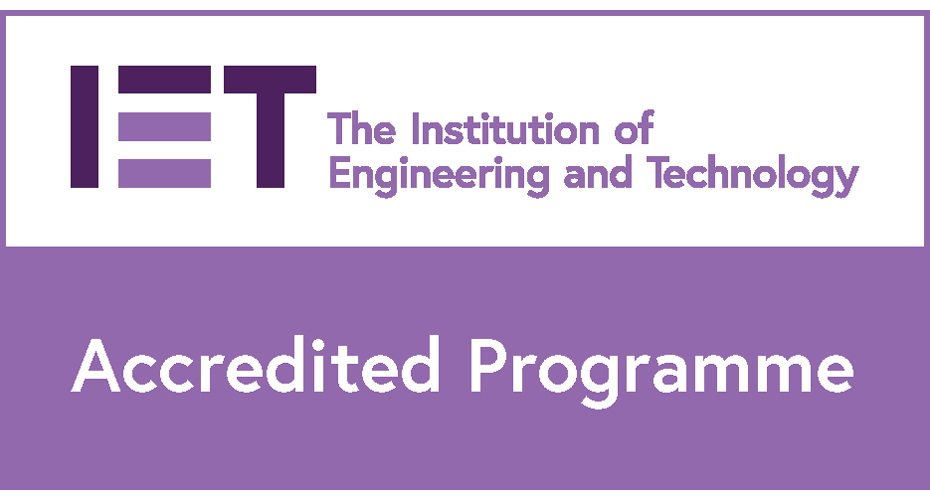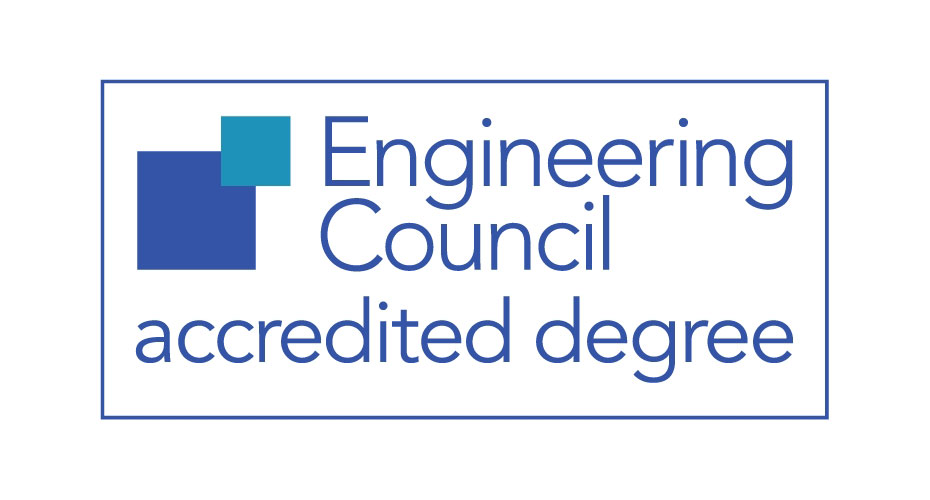| UCAS code | H610 |
|---|---|
| Duration | 3 years |
| Entry year | 2024 |
| Campus | Streatham Campus |
| Discipline | Engineering |
| Contact | Web: Enquire online |
| Typical offer | A level: AAB - ABB |
|---|---|
|
A-Level: BBB-BBC |
| UCAS code | H611 |
|---|---|
| Duration | 4 years |
| Entry year | 2024 |
| Campus | Streatham Campus |
| Discipline | Engineering |
| Contact | Web: Enquire online |
| Typical offer | A level: AAB - ABB |
|---|---|
|
A-Level: BBB-BBC |
Overview
- Power your future in electronic innovation with our BEng Electronic Engineering programme. This dynamic field of engineering spans everything from radio to space flight.
- During your first year, you'll enhance your engineering knowledge by delving into core disciplines alongside Electronic Engineering.
- Taught by experts in the field, you will explore a wide range of topics including communication and networking technologies, analogue and digital electronics design, and microcontroller engineering.
- Gain invaluable hands-on experience through real-world projects with industry partners, enabling you to apply your knowledge and boost your confidence.
- Become career-ready with opportunities to gain work experience through summer placements and the ‘Year in Industry’ programme.
![]()
Expertise in energy policy, marine renewables, biofuels, electrical power and networks, wind, photo-voltaic and thermal technologies
![]()
Top 10 in the UK for Engineering
7th for General Engineering in The Complete University Guide 2024
![]()
Top 15 in the UK for Electronic Engineering
12th for Electrical & Electronic Engineering in The Complete University Guide 2024
![]()
£6.5million investment in our teaching labs, workshop spaces and equipment
Entry requirements (typical offer)
| Qualification | Typical offer | Required subjects |
|---|---|---|
| A-Level | AAB - ABB | GCE AL Maths grade B and another science* subject at grade B. Candidates may offer GCE AL Maths, Pure Maths or Further Maths |
| IB | 34/665-32/655 | HL5 in Mathematics (Analysis and approaches or Applications and interpretations) and HL5 in another Science subject. Applicants achieving IB Maths SL7 plus IB HL5 in Physics will also be considered. |
| BTEC | DDD - DDM | See below under 'read more' for further information |
| GCSE | 4 or C | Grade 4/C in GCSE English language |
| Access to HE | 30 L3 Credits at Distinction Grade and 15 L3 credits at Merit Grade - 24 L3 Credits at Distinction Grade and 21 L3 credits at Merit Grade. | 12 L3 Credits at Merit Grade in Mathematics and 12 L3 Credits at Merit Grade in an acceptable Science subject area |
| T-Level | Distinction | T-level in Design and Development for Engineering & Manufacturing only, GCE A Level Maths is still required |
| Contextual Offer | A-Level: BBB-BBC |
Specific subject requirements must still be achieved where stated above. Find out more about contextual offers. |
| Other accepted qualifications | ||
| English language requirements |
International students need to show they have the required level of English language to study this course. The required test scores for this course fall under Profile B1. Please visit our English language requirements page to view the required test scores and equivalencies from your country. |
|
NB General Studies is not included in any offer.
Grades advertised on each programme webpage are the typical level at which our offers are made and provide information on any specific subjects an applicant will need to have studied in order to be considered for a place on the programme. However, if we receive a large number of applications for the programme we may not be able to make an offer to all those who are predicted to achieve/have achieved grades which are in line with our typical offer. For more information on how applications are assessed and when decisions are released, please see: After you apply
*GCE AL/AS science includes: Biology/Human Biology**; Chemistry; Computing; Design and Technology; Economics; Electronics; Environmental Science; Environmental Studies; Geography; Geology; Life and Health Sciences; Physical Education; Physics; Psychology; Science (applied); Statistics.
**If more than one of these is taken they would only count as one 'science' but could count as two A-levels towards our general requirements.
BTEC Extended Diploma
Applicants studying one of the following BTEC Extended Diplomas will be considered without a GCE AL science subject, GCE AL Maths is still required: Applied Science, Aeronautical Engineering, Building Services Engineering Construction and the Built Environment, Civil Engineering, Operations and Maintenance Engineering, Computer Engineering, Electrical/Electronic Engineering, Engineering, Manufacturing Engineering, Mechanical Engineering, Environmental Sustainability.
For any questions relating to entry requirements please contact the team via our online form or 01392 724061.
Accreditations


Certain programmes are subject to accreditation and/ or review by professional and statutory regulatory bodies (PSRBs).
The Electronic Engineering BEng (Hons) Electronic Engineering with Year in Industry BEng (Hons) are accredited by the Institution of Engineering and Technology (IET) as:
- fully satisfying the educational base for an Incorporated Engineer (IEng).
- partially satisfying the educational base for a Chartered Engineer (CEng).
A programme of accredited further learning will be required to complete the educational base for CEng. See www.theiet.org for further information.
Accreditation is a mark of assurance that the degree meets the standards set by the Engineering Council in the UK Standard for Professional Engineering Competence (UK-SPEC).
Accreditation is awarded for a maximum of 5 years under each assessment exercise. The dates applicable to the current accreditation of this degree programme can be viewed on the Engineering Council list of accredited degrees: www.engc.org.uk/acad.
I have always wanted to study engineering. However, I was initially unsure whether I should study mechanical, electronic or materials. During my first year, I became much more familiar with the different areas of engineering, and I found that electronics suited my passion. Taking things from theory to practical design is my favourite part of the course. In my second year we were tasked with creating a device or circuit design. I think as engineers we always find making things the most rewarding part.
As part of my course, I did a placement with NXP Laboratories UK Ltd. in Southampton. It was a wonderful experience as I had the chance to work with senior engineers. I was mainly responsible for practical testing and implementation. I also had the chance to do some designing while I was there. I created code and circuit designs that are actually going to be used in the final product for the company.
Yogen
BEng Electronic Engineering With Year in Industry
Course content
Collaborative modules in your first year will give you a broad knowledge across all core engineering disciplines. As you progress through your degree you’ll study increasingly advanced topics aligned to our research strengths in areas such as Communication and Networking Technologies, Analogue and Digital Electronics Design and Microcontroller Engineering.
The modules we outline here provide examples of what you can expect to learn on this degree course based on recent academic teaching. The precise modules available to you in future years may vary depending on staff availability and research interests, new topics of study, timetabling and student demand.
The multidisciplinary ethos of the first year builds core theoretical and practical knowledge in all engineering disciplines, giving you the opportunity to transfer at the end of the first year. A year-long multidisciplinary group project provides a means of putting core knowledge into practice.
Compulsory modules
| Code | Module | Credits |
|---|---|---|
| ENG1002 | Engineering Mathematics and Scientific Computing | 30 |
| ENG1005 | Multi-Disciplinary Group Challenge Project | 30 |
| ENG1006 | Entrepreneurship 1 | 15 |
| ENG1007 | Fundamentals of Mechanics | 15 |
| ENG1008 | Fundamentals of Materials | 15 |
| ENG1009 | Fundamentals of Electronics | 15 |
Your second year will build on the knowledge gained in your first year as well as introducing you to new topics such as microcontrollers and digital electronics design. You will also study exciting and topical areas of engineering mathematics such as Data Science and Artificial Intelligence.
Compulsory modules
| Code | Module | Credits |
|---|---|---|
| ENG2003 | Electronic Engineering Challenge Project | 30 |
| ENG2009 | Modelling of Engineering Systems | 15 |
| ENG2017 | Communication and Networking Technologies | 15 |
| ENG2118 | Analogue and Digital Electronics Design | 15 |
| ENG2004 | Entrepreneurship 2 | 15 |
| ENG2008 | Microcontroller Engineering | 15 |
| ENG2006 | Industry 4.0 | 15 |
If you are studying ‘with Year in Industry’ you will spend your third year on placement and carry out a 120 credit module. For more information about the ‘with Year in Industry’ programme, please see the course variants.
The final year of your degree includes a substantial individual project. Guided by a specialist academic supervisor, you’ll put into practice your research, project management and engineering skills and develop your own solution to a real-world electronic engineering challenge.
Compulsory modules
| Code | Module | Credits |
|---|---|---|
| ECM3175 | Individual Project | 30 |
| ENG3018 | Control Engineering | 15 |
| ECM3166 | Communications Engineering | 15 |
| ENG3012 | Mechatronics | 15 |
| ECM3165 | Digital Signal Processing | 15 |
| ENG3004 | Engineering Electromagnetics | 15 |
Optional modules
| Code | Module | Credits |
|---|---|---|
| Option Group A: Select 1: | ||
| ECM3153 | Management of Product Development | 15 |
| ENG3010 | Industrial Awareness & Problem Solving | 15 |
| ENG3011 | Management and Leadership | 15 |
| PHY3222 | Energy, Materials and Sustainability | 15 |
| ENG3023 | Zero Emission Vehicles | 15 |
Course variants
UCAS code: H611
Our four year ‘with Year in Industry’ programme includes a paid placement in business or industry for the duration of your third year. Work experience is a real advantage when entering the graduate job market. It’s also a great way to try out different jobs and to make contacts within companies you’re interested in working for.
Does it count towards my degree?
Yes, it’s worth 120 credits.
How does it affect my tuition fee?
During this year you will pay a reduced tuition fee. Visit the Tuition Fees page for more information.
How do I apply?
You can apply for this programme through UCAS using the code at the top of this page, or transfer onto this option at the end of your first year in an Exeter-based Engineering degree.
Preparation and support
We will help you to prepare for your work placement from early in your studies. A special module 'Employability and Placement Preparation for Engineers' takes place at the start of your second year. This is an opportunity to start thinking about your placement well in advance. You’ll also be invited to attend workshops offering guidance and support.
Fees
Tuition fees for 2024 entry
UK students: £9,250 per year
International students: £29,700 per year
Scholarships
The University of Exeter has many different scholarships available to support your education, including £5 million in scholarships for international students, such as our Global Excellence Scholarships*. Financial support is also available for students from disadvantaged backgrounds, lower income households and other under-represented groups to help them access, succeed and progress through higher education.
* Terms and conditions apply. See online for details.
Learning and teaching
You’ll typically have between 15 and 32 hours of direct contact time per week with your tutors and you will be expected to supplement your lectures with independent study. You should expect your total workload to average about 40 hours per week during term time.
In addition to lectures you’ll also have access to our workshops and laboratories where you’ll be trained to use specialist equipment, supporting and developing what you’ve learnt in the classroom and enabling you to put what you’ve learnt into practice.
A research and practice led culture
All our academic staff are internationally-recognised scientists working across a wide range of topics. Your course will draw on the very latest ideas, research discoveries and new technologies in the field. You’ll be able to participate directly with current research at various stages throughout your degree.
Student projects are often linked to our research activities and may involve working with industrial partners. Recent projects include the development and investigation of a two way wireless charging system for mobile devices and designing a vehicular robot for landmine detection.
Assessment
Modules are assessed by a combination of continuous assessment through small practical exercises, project work, essay writing, presentations and exams. You must pass your first year assessment in order to progress to the second year, but the results do not count towards your degree classification.
Project work is a core element of this degree, providing invaluable experience of problem-solving, engineering design and team working. Projects are typically industrially driven, are commercially relevant and often directly involve a company.
Optional modules outside of this course
Each year, if you have optional modules available, you can take up to 30 credits in a subject outside of your course. This can increase your employability and widen your intellectual horizons.
Proficiency in a second subject
If you complete 60 credits of modules in one of the subjects below, you may have the words 'with proficiency in [e.g. Social Data Science]' added to your degree title when you graduate.
- A Foreign Language
- Data Science
- Entrepreneurship
- Innovation
- Law
- Leadership
- Social Data Science
Your future

Career opportunities for engineers are almost limitless, as engineers can be found working in the public sector, in health, communications, education, construction, defence, finance and manufacturing. Engineers have a reputation as being articulate, numerate, problem solvers, who claim great job satisfaction. Typically, salaries are significantly higher for engineering graduates than the average for other graduates.
Exeter has an excellent reputation with graduate recruiters and a strong employment record. Our graduates excel in specialist engineering fields and across a broad range of other sectors. We offer a very wide range of opportunities for you to develop the skills employers are looking for.
Employer visits
Throughout your degree you will have the opportunity to meet with graduate employers. Professional engineers visit the university to hold mock interviews, allowing you to discuss your career opportunities at an early enough stage to inform your choice of modules and placement decisions.
Career paths
The broad-based skills acquired during your degree will give you an excellent grounding for a wide variety of careers, not only those related to Engineering but also in wider fields. Examples of roles recent graduates are now working as include:
- Aerospace Engineer
- Chartered and Certified Accountant
- Civil Engineer
- Electronics Engineer
- Engineering Project Manager
- Project Engineer
- Information Technology Professional
- Mechanical Engineer
- Programmer
- Software Developer











